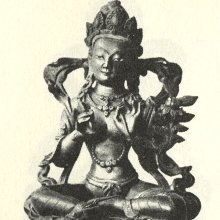Dyuti, Dyutī: 20 definitions
Introduction:
Dyuti means something in Buddhism, Pali, Hinduism, Sanskrit, Jainism, Prakrit, Hindi. If you want to know the exact meaning, history, etymology or English translation of this term then check out the descriptions on this page. Add your comment or reference to a book if you want to contribute to this summary article.
Dyuti has 19 English definitions available.
Alternative spellings of this word include Duty.
Images (photo gallery)
Languages of India and abroad
Sanskrit dictionary
[Deutsch Wörterbuch]
Source: Cologne Digital Sanskrit Dictionaries: Böhtlingk and Roth Grosses Petersburger WörterbuchDyuti (द्युति):—(von 1. dyut)
1) f. Glanz (eig. und übertr.; nach den Lexicogrr. auch Lichtstrahl); Würde [Amarakoṣa 1, 1, 2, 19. 35.] [Hemacandra’s Abhidhānacintāmaṇi 100.] [Anekārthasaṃgraha 2, 172.] [Medinīkoṣa t. 25.] indu [Bhartṛhari 1, 66. 79.] tuṣārakaluṣadyutī raviśaśāṅkau [Varāhamihira’s Bṛhajjātaka S. 21, 20. 24, 5. 14. 68, 7. 69, 16.] suvarṇapuṅkha [Raghuvaṃśa 3, 64.] mārakatī [Prooemium im Hitopadeśa 41.] dṛṣṭvaiva taṃ paraṃ rūpaṃ dyutiṃ ca paramāmiha [Nalopākhyāna 12, 52.] [Bhāgavatapurāṇa 8, 5, 42.] saiva kāntirmanmathāpyāyitā dyutiḥ [Sāhityadarpana 52, 7.] saiṃhī [Hitopadeśa I, 167.] brāhmī [Varāhamihira’s Bṛhajjātaka S. 80 (79), 3.] dyutinidhidhanabhāgin [BṚH. 17, 12.] mahā adj. von Göttern und Menschen [Manu’s Gesetzbuch 1, 87.] [Nalopākhyāna 12, 10.] [Hiḍimbavadha 2, 19.] [Rāmāyaṇa 1, 65, 15. 3, 15, 9.] der Glanz als Göttin personif. [Harivaṃśa 14035.] —
2) m. Nomen proprium eines der Saptarṣi unter der Regierung des Manu Merusāvarna [?IV Harivaṃśa 481.] eines Sohnes des Manu Tāmasa [428.]
--- OR ---
Dyuti (द्युति):—
1) in der Dramatik drohende Haltung: tarjanodvejane dyutiḥ [DAŚAR.1,42.] [Sāhityadarpana 382.] [PRATĀPAR. 22,a,5. 41,b,6.] parihāsavaco narma dhṛtistajjā dyutirmatā [DAŚAR. 1, 31.] narma [Scholiast S. 24.] —
2) [Z. 2] lies Merusāvarṇa.
Source: Cologne Digital Sanskrit Dictionaries: Sanskrit-Wörterbuch in kürzerer FassungDyuti (द्युति):——
1) f. — a) Glanz , Pracht , Schönheit [297,3.300,28.] — b) Würde , Majestät. — c) in der Dramatik eine drohende Haltung. — d) als Göttin personificirt. —
2) m. Nomen proprium — a) eines Ṛṣi unter Manu Merusāvarṇa. — b) eines Sohnes des Manu Tāmasa.
Sanskrit, also spelled संस्कृतम् (saṃskṛtam), is an ancient language of India commonly seen as the grandmother of the Indo-European language family (even English!). Closely allied with Prakrit and Pali, Sanskrit is more exhaustive in both grammar and terms and has the most extensive collection of literature in the world, greatly surpassing its sister-languages Greek and Latin.
See also (Relevant definitions)
Starts with (+7): Dyutiabhigrahana, Dyutiabhigrrahaka, Dyutidhara, Dyutigare, Dyutigrahaka, Dyutigumdu, Dyutikara, Dyutikirana, Dyutila, Dyutimali, Dyutiman, Dyutimant, Dyutimanta, Dyutimapaka, Dyutimapana, Dyutimapanashastra, Dyutimat, Dyutimati, Dyutimdhara, Dyutirasayanashastra.
Ends with (+36): Achiradyuti, Aciradyuti, Adyuti, Ahimadyuti, Amaladyuti, Ambakadyuti, Amitadyuti, Amritadyuti, Anudyuti, Apamgadyuti, Arkadyuti, Atreyadudyuti, Brihaddyuti, Candradyuti, Chandradyuti, Devadyuti, Devarajasamadyuti, Dhyanadyuti, Divyadyuti, Gharmadyuti.
Full-text (+91): Aciradyuti, Jui, Kshanadyuti, Gharmadyuti, Himadyuti, Rajatadyuti, Kapiladyuti, Dyutikara, Narmadyuti, Dyutila, Mahadyuti, Candradyuti, Amitadyuti, Tuhinadyuti, Dyutidhara, Dhyanadyuti, Shitadyuti, Tivradyuti, Kritadyuti, Saimha.
Relevant text
Search found 31 books and stories containing Dyuti, Dyutī, Ḍyūṭī; (plurals include: Dyutis, Dyutīs, Ḍyūṭīs). You can also click to the full overview containing English textual excerpts. Below are direct links for the most relevant articles:
Garga Samhita (English) (by Danavir Goswami)
Verse 4.19.90 < [Chapter 19 - A Thousand Names of Srī Yamunā]
Verse 3.2.5 < [Chapter 2 - The Great Festival of Śrī Girirāja]
Verse 2.9.7 < [Chapter 9 - Brahmā’s Prayers]
Sahitya-kaumudi by Baladeva Vidyabhushana (by Gaurapada Dāsa)
Text 4.76 < [Chapter 4 - First-rate Poetry]
Text 10.267 < [Chapter 10 - Ornaments of Meaning]
Text 4.17 < [Chapter 4 - First-rate Poetry]
Bhakti-rasamrta-sindhu (by Śrīla Rūpa Gosvāmī)
Verse 2.1.329 < [Part 1 - Ecstatic Excitants (vibhāva)]
Verse 3.4.24 < [Part 4 - Parenthood (vātsalya-rasa)]
Verse 3.3.72 < [Part 3 - Fraternal Devotion (sakhya-rasa)]
Shrimad Bhagavad-gita (by Narayana Gosvami)
Verse 11.17 < [Chapter 11 - Viśvarūpa-darśana-yoga (beholding the Lord’s Universal Form)]
Tattvartha Sutra (with commentary) (by Vijay K. Jain)
Verse 4.20 - The characteristics of the Vaimānika deva < [Chapter 4 - The Celestial Beings]
Trishashti Shalaka Purusha Caritra (by Helen M. Johnson)
Part 9: Story of the seven ascetic-brothers < [Chapter VIII - The abandonment of Sītā]
